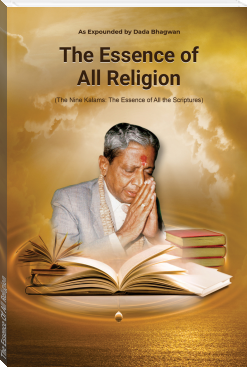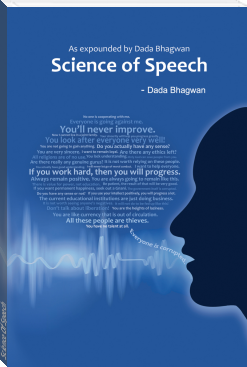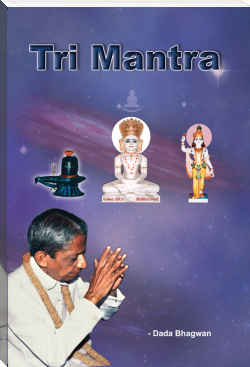author - "Dada Bhagwan"

A lot of people struggle to understand what the truth is, what is right and what is wrong. There is perpetual dilemma to distinguish between right and wrong. According to Dada Bhagwan, the Gnani Purush (the enlightened one), in the worldly life there are three types of truth. One - absolute truth (self) second - relative truth and third - untruth. In this book, Dadashri has discussed the meaning of absolute and relative truth. Absolute truth 'I' can never be destroyed, it is eternal. It belongs

There are times in life when we must endure suffering due to no fault on our part – or so it seems. In painful circumstances, we naturally question, “Why me? Am I wrong? It’s not my fault!” Such situations may feel like the very definition of suffering. In the book “Fault is of the Sufferer”, Gnani Purush (embodiment of Self knowledge) Dada Bhagwan provides spiritual solutions to common and everyday forms of suffering such as dealing with difficult people, facing unhealthy relationships,

Those seeking to lead a spiritual life inevitably face challenges in their sincere pursuit of spirituality and practice. As spiritual development progresses, facing the many unintentional mistakes made through mind, speech, and conduct become disconcerting. Naturally one begins to wonder, “How to forgive and forget in unhealthy relationships?”, “How to forgive yourself - both for mistakes of the past and for ongoing mistakes in the present?” One of the most powerful tools for spiritual healing

Those seeking to lead a spiritual life inevitably face challenges in their pursuit of spirituality and practice. As spiritual development progresses, facing one’s faults, failures, and unintentional mistakes become disconcerting – even for the most sincere seeker. One may then ask, “What are the benefits of the different types of religion? From the many religions of the world, which practices will accelerate my spiritual growth? In actuality, how to live exactly?” In the book “The Essence of

Those seeking to lead a spiritual life may naturally become inspired to live in peace and non violence. To learn spiritual practices to develop these values, one may turn to spiritual teachers, and to variety of religion. But beginning to cultivate spiritual awareness is not always as simple as it seems – especially in family / unhealthy relationships, or while dealing with difficult people. Daily interactions such as these may feel like the very definition of conflict! In the book

Those seeking to lead a spiritual life, or just wondering how to become more spiritual may become inspired towards serving others, or giving Seva (selfless service). One might be left wondering, “Is service to humanity a higher means to make a donation – or should I simply donate to charity? What are the best charities to donate to, or to serve? How does Seva support my spiritual development? Is there spiritual power and spiritual transformation to be gained through it?” In the book “Right

For those wondering how to lead a spiritual life, Pure Love emerges as an essential value. Naturally one begins inquiring into the ultimate meaning of love, true love, and unconditional love. Other questions may also arise, such as: To cultivate unconditional love, is forgiveness required? If so, how can I learn to practice forgiveness prayer? In the context of unconditional love, what is marriage? Can a husband and wife relationship transform into living for love, and ultimately become an

Those seeking to lead a spiritual life may become curious as to what is ahimsa (non violence), and inspired to practice it. But understanding how to live in non violence is not as simple as it seems, and practicing no violence in daily life can quickly become bewildering. To someone just beginning to cultivate non-violence, daily interactions might even begin to feel like the very definition of conflict! In the book “Non-Violence”, Gnani Purush (embodiment of Self knowledge) Dada Bhagwan offers

The religions of the world preserve the knowledge and protect the secrets of ancient powerful mantras. At the heart of world religion, and among the most powerful mantras in the history of religion, is the Navkar mantra, or Trimantra. In the book “Trimantra”, Gnani Purush (embodiment of Self knowledge) Dada Bhagwan explains the Trimantra, its mantra meaning, and the extraordinary benefits of its recitation. Whether wishing to live with no worry while facing problems in everyday life, wondering

Among the myriad of relationships in life, the one between a Guru and disciple is most sacred and unique. In the book “Guru and Disciple”, Gnani Purush (embodiment of Self knowledge) Dada Bhagwan provides insight into the nature of the Guru-disciple relationship and offers in-depth answers to questions like: “What are definitions of Guru, and disciple? How is a Guru necessary in spiritual transformation?” “How does a spiritual Guru differ from a spiritual teacher, a spiritual advisor, or from

A lot of people struggle to understand what the truth is, what is right and what is wrong. There is perpetual dilemma to distinguish between right and wrong. According to Dada Bhagwan, the Gnani Purush (the enlightened one), in the worldly life there are three types of truth. One - absolute truth (self) second - relative truth and third - untruth. In this book, Dadashri has discussed the meaning of absolute and relative truth. Absolute truth 'I' can never be destroyed, it is eternal. It belongs

There are times in life when we must endure suffering due to no fault on our part – or so it seems. In painful circumstances, we naturally question, “Why me? Am I wrong? It’s not my fault!” Such situations may feel like the very definition of suffering. In the book “Fault is of the Sufferer”, Gnani Purush (embodiment of Self knowledge) Dada Bhagwan provides spiritual solutions to common and everyday forms of suffering such as dealing with difficult people, facing unhealthy relationships,

Those seeking to lead a spiritual life inevitably face challenges in their sincere pursuit of spirituality and practice. As spiritual development progresses, facing the many unintentional mistakes made through mind, speech, and conduct become disconcerting. Naturally one begins to wonder, “How to forgive and forget in unhealthy relationships?”, “How to forgive yourself - both for mistakes of the past and for ongoing mistakes in the present?” One of the most powerful tools for spiritual healing

Those seeking to lead a spiritual life inevitably face challenges in their pursuit of spirituality and practice. As spiritual development progresses, facing one’s faults, failures, and unintentional mistakes become disconcerting – even for the most sincere seeker. One may then ask, “What are the benefits of the different types of religion? From the many religions of the world, which practices will accelerate my spiritual growth? In actuality, how to live exactly?” In the book “The Essence of

Those seeking to lead a spiritual life may naturally become inspired to live in peace and non violence. To learn spiritual practices to develop these values, one may turn to spiritual teachers, and to variety of religion. But beginning to cultivate spiritual awareness is not always as simple as it seems – especially in family / unhealthy relationships, or while dealing with difficult people. Daily interactions such as these may feel like the very definition of conflict! In the book

Those seeking to lead a spiritual life, or just wondering how to become more spiritual may become inspired towards serving others, or giving Seva (selfless service). One might be left wondering, “Is service to humanity a higher means to make a donation – or should I simply donate to charity? What are the best charities to donate to, or to serve? How does Seva support my spiritual development? Is there spiritual power and spiritual transformation to be gained through it?” In the book “Right

For those wondering how to lead a spiritual life, Pure Love emerges as an essential value. Naturally one begins inquiring into the ultimate meaning of love, true love, and unconditional love. Other questions may also arise, such as: To cultivate unconditional love, is forgiveness required? If so, how can I learn to practice forgiveness prayer? In the context of unconditional love, what is marriage? Can a husband and wife relationship transform into living for love, and ultimately become an

Those seeking to lead a spiritual life may become curious as to what is ahimsa (non violence), and inspired to practice it. But understanding how to live in non violence is not as simple as it seems, and practicing no violence in daily life can quickly become bewildering. To someone just beginning to cultivate non-violence, daily interactions might even begin to feel like the very definition of conflict! In the book “Non-Violence”, Gnani Purush (embodiment of Self knowledge) Dada Bhagwan offers

The religions of the world preserve the knowledge and protect the secrets of ancient powerful mantras. At the heart of world religion, and among the most powerful mantras in the history of religion, is the Navkar mantra, or Trimantra. In the book “Trimantra”, Gnani Purush (embodiment of Self knowledge) Dada Bhagwan explains the Trimantra, its mantra meaning, and the extraordinary benefits of its recitation. Whether wishing to live with no worry while facing problems in everyday life, wondering

Among the myriad of relationships in life, the one between a Guru and disciple is most sacred and unique. In the book “Guru and Disciple”, Gnani Purush (embodiment of Self knowledge) Dada Bhagwan provides insight into the nature of the Guru-disciple relationship and offers in-depth answers to questions like: “What are definitions of Guru, and disciple? How is a Guru necessary in spiritual transformation?” “How does a spiritual Guru differ from a spiritual teacher, a spiritual advisor, or from